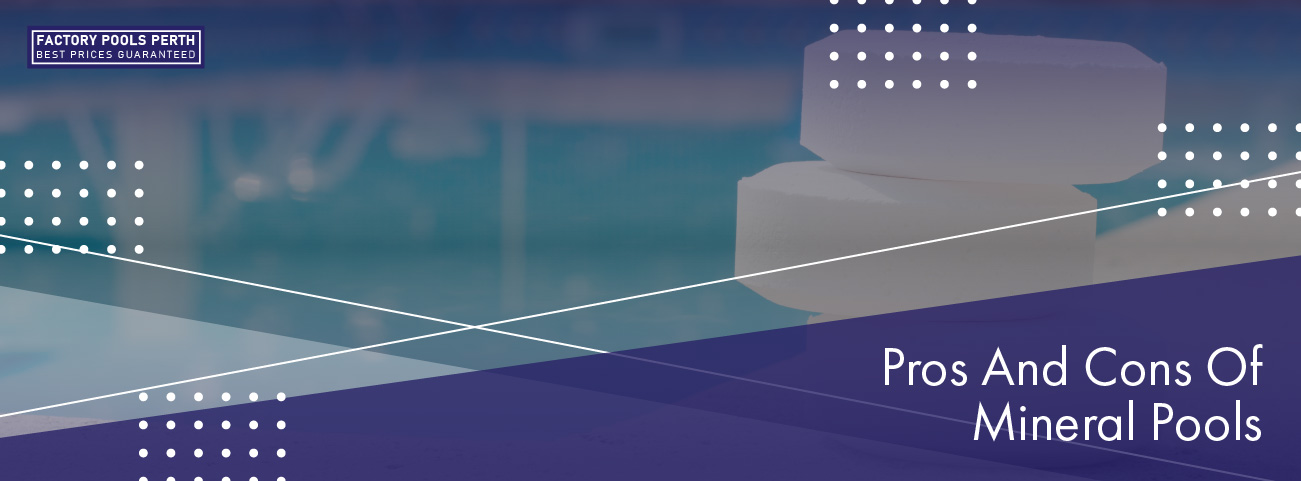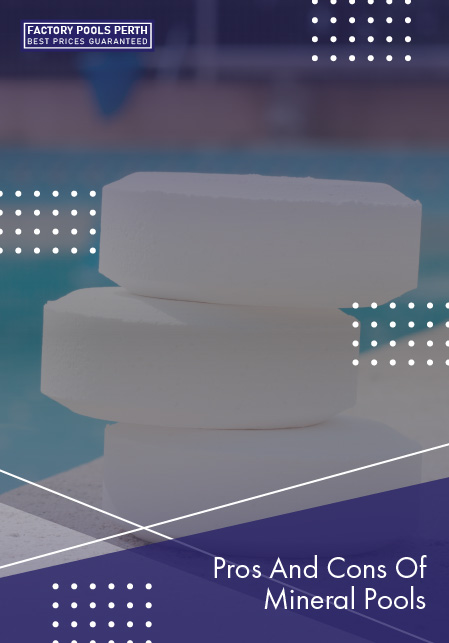Pros And Cons Of Mineral Pools
In the realm of residential swimming pools, the shimmering waters of mineral pools are making quite a splash. Unlike the standard chlorinated pools we're all familiar with, mineral pools offer an alternative swimming experience complemented by naturally sourced minerals. Homeowners considering a pool installation or renovation are increasingly intrigued by the possibility of healthier and less chemically intense pool maintenance. However, the allure of mineral pools isn't without its own set of disputes. By diving into the details of what mineral pools offer, we can better understand if they're the right fit for your home's aquatic aspirations.

Understanding Mineral Pools
Before delving into the virtues and vices of mineral pools, let’s first explore what distinguishes them. Mineral swimming pools make use of a unique blend of minerals, sourced from elements such as copper, silver, and zinc. These minerals work together to establish a water treatment system that reduces the dependence on the concentrated chlorine typically found in conventional pools. This alternative system creates a gentler, more organic pool environment, aiming to provide swimmers with a range of health benefits while enjoying a leisurely swim.
Pros of Mineral Pools
Health Benefits
Mineral pools have long been praised for their reported health benefits. The presence of trace amounts of copper in these pools is said to contribute to skin enhancement, promoting a healthy and radiant complexion. Additionally, the inclusion of zinc is believed to provide support to the body’s immune system, helping to bolster overall wellness. Individuals with pre-existing skin conditions often find solace in mineral pools as they offer relief in comparison to traditional chlorinated water, making for a more soothing and therapeutic swimming experience.
Lower Chemical Usage
Because mineral pools are equipped to operate with less chlorine, the ‘chemical’ factor of pool maintenance is significantly reduced. This benefit appeals to homeowners looking for a more eco-friendly and less odorous pool experience. Moreover, the fewer chemicals used in the pool, the less risk there is for accidental overexposure and skin sensitivities.
Reduced Skin and Eye Irritation
The lesser amount of chlorine in mineral pools is noticeable, especially for those who are susceptible to skin dryness or irritation. The milder chlorination helps maintain a pool environment that is friendlier to your body’s largest organ – the skin – and less likely to leave you reaching for the lotion right after your swim.

Cons of Mineral Pools
Initial Cost
The initial cost of setting up a mineral pool system is usually greater than that of a traditional chlorine pool. This is because of the need for specific equipment to regulate the mineral levels in the water, ensuring a balanced environment. Homeowners should meticulously evaluate their financial plans, considering the upfront expenditure in comparison to the lasting benefits and the overall impact on water quality and maintenance.
Maintenance Requirements
While mineral pools promise reduced maintenance, they are not maintenance-free. Regular checks on mineral levels are essential, as is the occasional addition of shock treatments to keep the water safe. Homeowners must stay on top of these tasks to ensure the pool waters remain clear and balanced, which may require investing in additional pool care education or service.
Limited Availability of Products
Compared to the easily accessible variety of products tailored for chlorine pools, the selection for mineral pools remains somewhat restricted. This disparity in options can lead to maintenance and problem-solving becoming more intricate. When faced with issues, the process of identifying the appropriate solution may not be as straightforward, posing challenges that require careful consideration and exploration of alternatives.
Comparison with Traditional Chlorine Pools
Cost Analysis
When considering the cost aspect, a traditional chlorine pool may seem more budget-friendly initially. Nevertheless, factoring in the ongoing expenses of chlorine and other chemicals over time, the reduced chemical usage in a mineral pool can significantly balance the equation. Homeowners who initially opt for the cost-saving advantage of a traditional pool setup might be taken aback by the cumulative expenses throughout the pool’s lifespan.

Health and Environmental Impact
The potential health benefits of mineral pools are significant due to their reduced chemical content in the water. With lower levels of harsh chemicals, mineral pools offer a more natural and gentle experience for swimmers, promoting overall well-being. Additionally, the eco-friendly nature of mineral pools extends beyond personal health benefits. By minimising the release of chlorinated compounds into the atmosphere and local environments, mineral pools play a role in preserving the surrounding ecosystem. This environmentally conscious choice not only benefits individuals but also contributes positively to the wider community by creating sustainable and eco-friendly living spaces.
Long-Term Considerations
In the long run, mineral pools can be more cost-effective due to their self-cleaning properties and reduced need for chemical treatments. However, they demand a distinct maintenance approach that focuses on balancing minerals and pH levels. Homeowners should weigh their readiness to adjust to this unique pool care routine, considering potential benefits such as softer water and reduced skin irritation. Additionally, they need to be prepared for any extra time or financial investments this approach might involve.
Conclusion
The decision to invest in a mineral pool system is not one to be taken lightly. It involves balancing the immediate costs with potential long-term savings, as well as weighing the advantages of a pool system that caters to your health and lifestyle. If you’re engaging in pool provision with Factory Pools Perth, for instance, it’s important to ask questions, seek advice, and consider your own pool user profile before taking the plunge.
For some, the additional cost and care of a mineral pool will be well worth the benefits. For others, the tried and true chlorine pool will continue to be the preferred path. Research and understanding are key as you wade through the offerings and arrive at a decision that will support your home’s aquatic wellness for years to come. Remember, the pool you choose should ultimately reflect your values and align with your wellness goals. Let this be just the starting point of your journey toward a home pool setup that’s as unique as you are.
Pros And Cons Of Mineral Pools
In the realm of residential swimming pools, the shimmering waters of mineral pools are making quite a splash. Unlike the standard chlorinated pools we're all familiar with, mineral pools offer an alternative swimming experience complemented by naturally sourced minerals. Homeowners considering a pool installation or renovation are increasingly intrigued by the possibility of healthier and less chemically intense pool maintenance. However, the allure of mineral pools isn't without its own set of disputes. By diving into the details of what mineral pools offer, we can better understand if they're the right fit for your home's aquatic aspirations.

Understanding Mineral Pools
Before delving into the virtues and vices of mineral pools, let’s first explore what distinguishes them. Mineral swimming pools make use of a unique blend of minerals, sourced from elements such as copper, silver, and zinc. These minerals work together to establish a water treatment system that reduces the dependence on the concentrated chlorine typically found in conventional pools. This alternative system creates a gentler, more organic pool environment, aiming to provide swimmers with a range of health benefits while enjoying a leisurely swim.
Pros of Mineral Pools
Health Benefits
Mineral pools have long been praised for their reported health benefits. The presence of trace amounts of copper in these pools is said to contribute to skin enhancement, promoting a healthy and radiant complexion. Additionally, the inclusion of zinc is believed to provide support to the body’s immune system, helping to bolster overall wellness. Individuals with pre-existing skin conditions often find solace in mineral pools as they offer relief in comparison to traditional chlorinated water, making for a more soothing and therapeutic swimming experience.
Lower Chemical Usage
Because mineral pools are equipped to operate with less chlorine, the ‘chemical’ factor of pool maintenance is significantly reduced. This benefit appeals to homeowners looking for a more eco-friendly and less odorous pool experience. Moreover, the fewer chemicals used in the pool, the less risk there is for accidental overexposure and skin sensitivities.
Reduced Skin and Eye Irritation
The lesser amount of chlorine in mineral pools is noticeable, especially for those who are susceptible to skin dryness or irritation. The milder chlorination helps maintain a pool environment that is friendlier to your body’s largest organ – the skin – and less likely to leave you reaching for the lotion right after your swim.

Cons of Mineral Pools
Initial Cost
The initial cost of setting up a mineral pool system is usually greater than that of a traditional chlorine pool. This is because of the need for specific equipment to regulate the mineral levels in the water, ensuring a balanced environment. Homeowners should meticulously evaluate their financial plans, considering the upfront expenditure in comparison to the lasting benefits and the overall impact on water quality and maintenance.
Maintenance Requirements
While mineral pools promise reduced maintenance, they are not maintenance-free. Regular checks on mineral levels are essential, as is the occasional addition of shock treatments to keep the water safe. Homeowners must stay on top of these tasks to ensure the pool waters remain clear and balanced, which may require investing in additional pool care education or service.
Limited Availability of Products
Compared to the easily accessible variety of products tailored for chlorine pools, the selection for mineral pools remains somewhat restricted. This disparity in options can lead to maintenance and problem-solving becoming more intricate. When faced with issues, the process of identifying the appropriate solution may not be as straightforward, posing challenges that require careful consideration and exploration of alternatives.
Comparison with Traditional Chlorine Pools
Cost Analysis
When considering the cost aspect, a traditional chlorine pool may seem more budget-friendly initially. Nevertheless, factoring in the ongoing expenses of chlorine and other chemicals over time, the reduced chemical usage in a mineral pool can significantly balance the equation. Homeowners who initially opt for the cost-saving advantage of a traditional pool setup might be taken aback by the cumulative expenses throughout the pool’s lifespan.

Health and Environmental Impact
The potential health benefits of mineral pools are significant due to their reduced chemical content in the water. With lower levels of harsh chemicals, mineral pools offer a more natural and gentle experience for swimmers, promoting overall well-being. Additionally, the eco-friendly nature of mineral pools extends beyond personal health benefits. By minimising the release of chlorinated compounds into the atmosphere and local environments, mineral pools play a role in preserving the surrounding ecosystem. This environmentally conscious choice not only benefits individuals but also contributes positively to the wider community by creating sustainable and eco-friendly living spaces.
Long-Term Considerations
In the long run, mineral pools can be more cost-effective due to their self-cleaning properties and reduced need for chemical treatments. However, they demand a distinct maintenance approach that focuses on balancing minerals and pH levels. Homeowners should weigh their readiness to adjust to this unique pool care routine, considering potential benefits such as softer water and reduced skin irritation. Additionally, they need to be prepared for any extra time or financial investments this approach might involve.
Conclusion
The decision to invest in a mineral pool system is not one to be taken lightly. It involves balancing the immediate costs with potential long-term savings, as well as weighing the advantages of a pool system that caters to your health and lifestyle. If you’re engaging in pool provision with Factory Pools Perth, for instance, it’s important to ask questions, seek advice, and consider your own pool user profile before taking the plunge.
For some, the additional cost and care of a mineral pool will be well worth the benefits. For others, the tried and true chlorine pool will continue to be the preferred path. Research and understanding are key as you wade through the offerings and arrive at a decision that will support your home’s aquatic wellness for years to come. Remember, the pool you choose should ultimately reflect your values and align with your wellness goals. Let this be just the starting point of your journey toward a home pool setup that’s as unique as you are.



